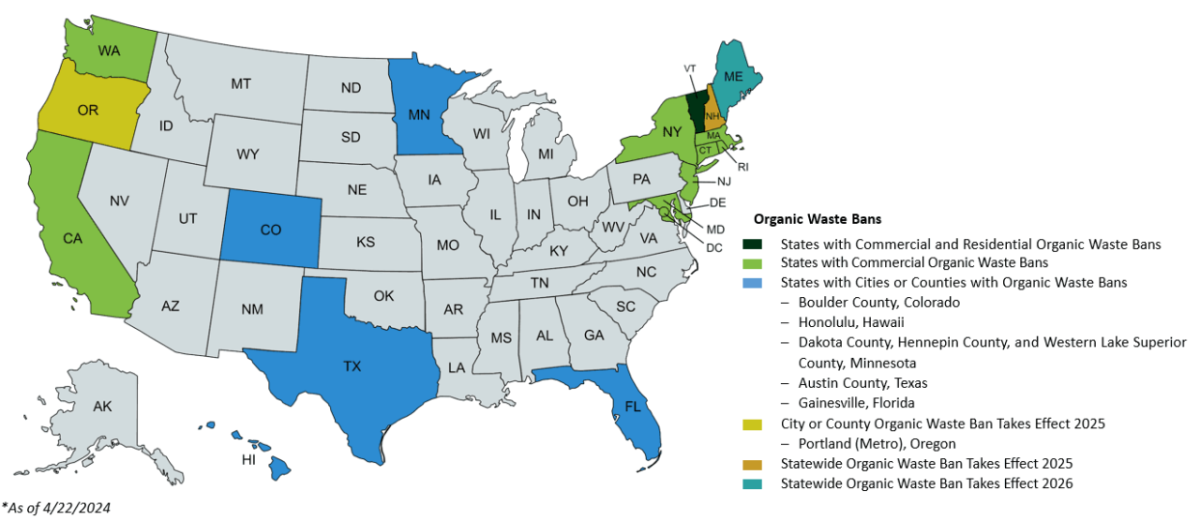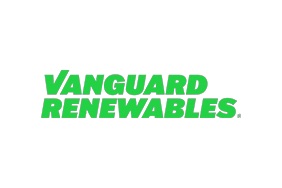Sustainability in Legislation: The Rise of Organic Waste Bans
Published 08-09-24
Submitted by Vanguard Renewables

Food and beverage waste has long been thrown away alongside non-organic waste streams, typically ending up in incinerators and landfills. In fact, according to the EPA, food is the most landfilled material. Beyond the fact that the organics sent to incineration and landfill lose any nutrient reclamation potential, the organic market itself is inherently both wasteful and harmful. The USDA claims that food waste is estimated to be 30-40% of the entire food supply. It seems counterintuitive that a third or more of all food produced is already considered “waste” and is just sent off to be destroyed or trapped inside the earth. Furthermore, when organics end up in landfills, they generate methane and other harmful greenhouse gases. The EPA has even found that wasted food is the cause of 58% of methane emissions from municipal solid waste landfills.
Such wasteful and harmful behavior is finally gaining recognition across the globe. This loss of nutrients and contribution to greenhouse gas emissions has been identified and mitigated in many countries, most notably in Western Europe. The U.S. is catching up to growing international pressures, with state and local governments across the country enacting organic waste bans and waste recycling laws. Recently, the White House announced the National Strategy for Reducing Food Loss and Waste and Recycling Organics, creating a national goal of halving food loss and waste by 2030. This diversion of organic waste to alternative sites other than landfills and incinerators allows the potential of those organics to be unlocked, encouraging a circular economy.
Organic waste, while creating trouble in landfills and incinerators, has many benefits to offer when diverted to a sustainable disposal destination alternative. The nutrients that would otherwise be trapped or burnt into disuse can be reclaimed, lessening the depletion of these precious resources and avoiding initial purchase costs. Furthermore, the harmful gases from the decomposition process can be captured and converted into renewable natural gas, decreasing greenhouse gas emissions.
Vanguard Renewables goes a step further, harnessing the power of waste and repurposing methane for good. Utilizing our depackaging facilities, we can accept many varieties of packaged food and beverage waste and separate the organics from any packaging. This allows us to recycle the packaging, further decreasing greenhouse gas emissions and wasteful behavior. We then send the processed organic waste to our anaerobic digesters, which collect the methane produced and convert it into renewable natural gas.
Our unique commitment to building our digesters on dairy farms allows us to help their industry, too. Not only do the dairy farmers receive important liquidity from their lease agreement, but they are also decarbonizing their farms and the dairy industry itself. The manure from their cattle is collected and goes into the digesters where the methanogenic bacteria break down the organic material to create methane. The methane is captured inside the tanks, meaning less greenhouse gas emissions from the farm. That trapped methane goes on to become renewable natural gas. As a fortunate byproduct of the anaerobic digestion process, the farms become noticeably less odorous; they receive near odorless fertilizer from the organic breakdown process, and soft bedding for their herd.
While steps are being taken in the U.S. to mitigate the food waste crisis, the initiatives are fledgling despite the White House’s 2030 goals. However, certain states and localities have already stepped up, and more legislation is constantly being introduced and is on the way.
Learn more about what legislation is currently in place here!
--
Gabriel McCollester, Vanguard Renewables

Vanguard Renewables
Vanguard Renewables
Vanguard Renewables, based in Weston, Massachusetts, is a national leader in developing food and dairy waste-to-renewable energy projects. The Company owns and operates on-farm anaerobic digester facilities in the northeast and currently operates manure-only digesters in the south and west for Dominion Energy. The Company plans to expand to more than 150 anaerobic digestion facilities by 2026. Vanguard Renewables is committed to advancing decarbonization by reducing greenhouse gas emissions from farms and food waste and supporting regenerative agriculture on partner farms through anaerobic digestion. Vanguard Renewables is a portfolio company of BlackRock Real Assets. To learn more about the Company, its energy partners, and the Farm Powered Strategic Alliance, visit www.vanguardrenewables.com
More from Vanguard Renewables

